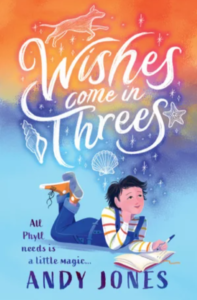Andy Jones, Wishes Come in Threes, Walker Books Australia, November 2022, 271 pp., RRP $14.99 (pbk), ISBN 9761529500862
Wishes Come in Threes is set in England but has universal themes. Phyllis, who prefers to be known as Phyll, is seeing a school counsellor after an uncharacteristic outburst at school. The counsellor is kind and understanding but has a speech defect that sometimes confuses Phyll – the titles of some chapters comes from one of these defects. Heather wants to understand why Phyll would suddenly become so angry and we, and Heather, find out that her mother, normally an energetic and gifted author has depression.
In order to try to help her overcome this, Phyll’s parents decide to move house to a quieter location. This necessitates Phyll also moving school, two great upheavals for her. Before she starts at the new school she attends Camp Sunshine, where she meets some of the other students who will go to school with her. The meeting is not an overall success as one of the girls Phyll encounters is a bully. Phyll’s encounter with Hilda does not augur well for a happy introduction to school.
She does, however, meet a boy named Clark who becomes a support and friend. Clark is constructed by the author in such a way to make the reader and Phyll believe that he must come from a very different family to Phyll’s – more stable and with fewer problems. However, in the book, as in life, appearances can be deceiving and we learn that Clark’s family is in fact quite dysfunctional, dysfunction that eventually leads to him, like Phyll, having to move house and school. A series of thefts of dogs from the area where the children live, is ultimately explained and, in so doing, the real background to Clark’s life is revealed.
At her new school, Phyll goes with a group to visit an aged care home where she meets an old man named Mr Djinn. This is the first allusion to the Arabian Nights. Who is the mysterious Mr Djinn who says he’s thousands of years old, has lived in a bottle and has been owned by a pirate? They have a kind of philosophical discussion on the nature of belief. Whatever he has been in the past, Mr Djinn becomes mentor for Phyll, someone she can rely on for advice and comfort. Perhaps, in her distress and dislocation Phyll needs to believe in the stories he tells and the suggestion that he is really a genie.
The narrative, told in the first-person by Phyll, changes in six-month intervals to explain why Phyll has moved and then to tell of her life at the new school and house. We see Phyll developing self-confidence and acceptance of her new life, helped in many ways, by Mr Djinn and by her fiend Clark. Her mother begins to read Treasure Island to her, a signifier of her improving mental health. Importantly, however, the book does not suggest that the path to overcoming mental health problems is simple.
Towards the end of the book, Phyll and Mr Djinn discuss the nature of magic and of wishes. How these operate and the importance of careful choices. The ending is enigmatic and thought-provoking. What is belief?
Phyll is an endearing character and her growth, difficulties and how she overcomes them will be familiar to many readers. The interaction with Mr Djinn is intriguing. This can be read as a straightforward narrative of growing up but there are other layers to be explored.
Reviewed by Margot Hillel


